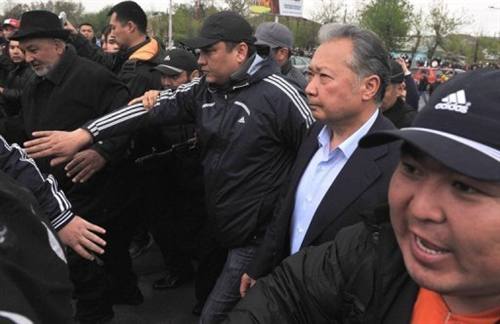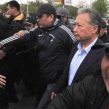
Kyrgyzstan’s Provisional Government Needs International Support, Oversight
Publication: Eurasia Daily Monitor Volume: 7 Issue: 78
By:

Kurmanbek Bakiyev was pressured by the OSCE, United States and European Union to leave Kyrgyzstan. On April 15, Kazakhstan dispatched a military aircraft to transfer Bakiyev and his family members to its territory. Several days later, the Kazakh government announced that Bakiyev had left the country for an unknown destination (www.akipress.kg, April 19). Belarusian President, Alyaksandr Lukashenka, extended a warm welcome to Bakiyev and his family members. It remains unknown if Bakiyev will use the opportunity, and find refuge in Belarus.
Initial predictions that the new government in Bishkek would choose to expel the US Transit Center in Manas are slowly fading. Acting Finance Minister, Temir Sariev, has requested payment in advance for the center’s rent. The US government also promised financial assistance and help in tracking Bakiyev’s bank accounts. The provisional government will need further international assistance in carrying out a referendum and parliamentary elections.
The new government has been moving swiftly to undo the remnants of Bakiyev’s political system. The national press has become noticeably freer. Yet, the government faces many challenges that might grow more complicated, as internal competition among its leaders intensifies. To date, most prominent leaders refrain from showing open support for the head of the provisional government Roza Otunbayeva. The forthcoming parliamentary elections will intensify competition among the political parties represented in the provisional government. Ata-Meken, the Social Democratic Party, and Ak-Shumkar are the three main forces currently making up the government in Bishkek.
Furthermore, along with substantive achievements, the provisional government is repeating some of the mistakes of Bakiyev’s regime during its first days in power. These include the lack of transparency in appointing new cabinet members. Leaders of the new government are criticized for distributing cabinet seats based on a desire to strengthen personal status in the emerging political regime, rather than making choices that would help to build an efficient government.
Moreover, the provisional government was also slow to restore order in the capital following the April 19 upheaval among hundreds of peasants seeking to seize land plots in the outskirts of Bishkek (www.akipress.kg, April 19). Rumors have spread about land seizures targeting specifically the ethnic Russian minority. Following the April 19 unrest in Bishkek, as well as police demonstrations in Osh city, the acting Interior Minister, Bolot Sherniyazov, was sacked, leaving the position vacant.
A constitutional referendum will be the provisional government’s first major test. The new constitution will shortly be presented to the public. Omurbek Tekebayev, the Head of the Ata-Meken Party currently responsible for constitutional reform, has been working on the new constitution for over two years.
Tekebayev’s project in late 2008 proposed setting quotas in parliament in order that no single party can monopolize power. That is, regardless of the number of votes a party receives, it will be unable to hold more that 60 percent of the seats, while the remaining 40 percent will be allocated proportionally to other parties. Such “forceful competition,” Tekebayev argued, will prevent one party from dominating the political and economic sectors (www.akipress.kg, April 18). His project was welcomed by the Kyrgyz opposition forces, yet it met with skepticism in the West.
Following the constitutional referendum, conducting free and fair parliamentary elections will be another important milestone for the provisional government. In order to carry out transparent elections Kyrgyzstan’s political forces will need to adopt new strategies of political campaigning and abandon those used in previous elections to gain instant support among the masses.
The parties currently represented in the provisional government will need to implement their election campaigns in the new mode. This includes laying out specific policy plans to the population, as opposed to luring voters by distributing food and goods by competing candidates before the elections. However, given that political parties are established around prominent political leaders as opposed to clearly identifiable party programs, changing election campaign modes might prove difficult.
Kyrgyzstan needs international support in promoting political reform. Kyrgyz civil society has the potential to contribute to constitutional reform and oversee elections. Yet, political competition, before and after parliamentary elections, will expose the fact that in the absence of strong state institutions, political opponents resort to forceful methods of political competition.
The international community must therefore closely monitor the referendum and elections in Kyrgyzstan. Members of the provisional government must be assisted in gaining legitimacy by engaging broader civil society. The judiciary must be strengthened before the political campaign begins, as corrupt courts often become the main battle ground for competing candidates. Finally, public debates on the latest developments must be streamed in local media, involving both local and international experts.




